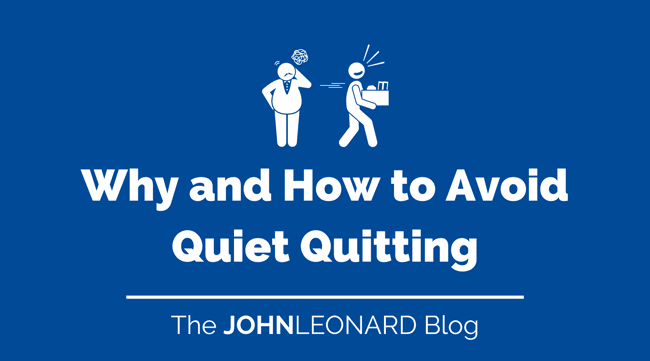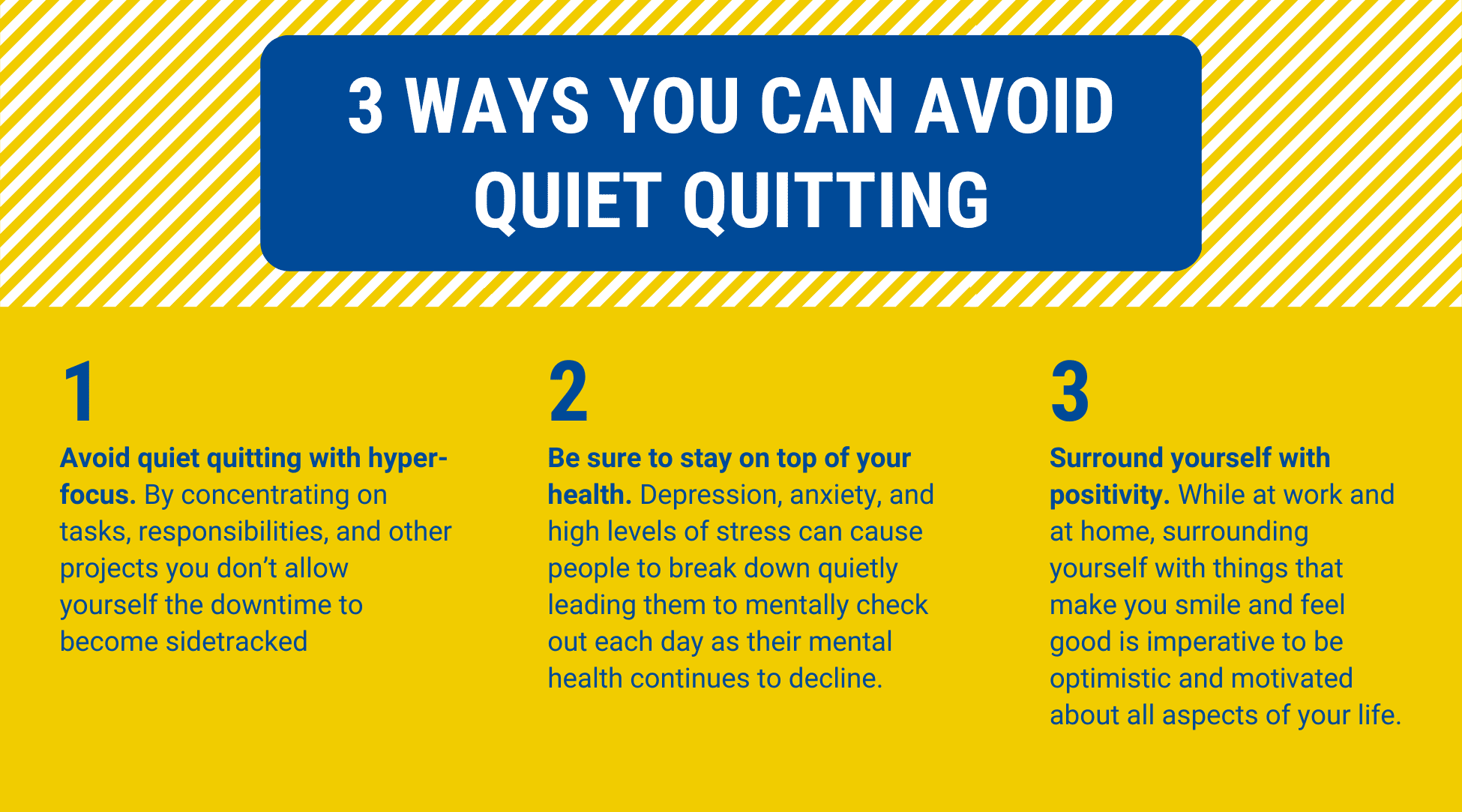
What is Quiet Quitting?
The answer’s simple. Quiet quitting is doing the bare minimum. It doesn’t mean ignoring your work, or your responsibilities. It was inspired to set boundaries and to help create a healthy work-life balance. However, quiet quitting isn’t for everyone. And it shouldn’t be the go-to mindset for anyone.
Why Should You Avoid Quiet Quitting?
While the concept of quiet quitting has many positive theorized outcomes, the negative effects can be detrimental to your future. Handling your responsibilities with a subpar attitude can leave your coworkers feeling uneasy about your work ethic, and could put unwarranted stress on them due to an influx of work. Being a team player is a key part of building healthy work relationships. Sometimes that means taking on extra work to help those around you. Doing so can help foster the attributes of a strong and successful team, giving you extra support to lean on when you may need it most.
Not only does quiet quitting negatively affect your co-workers but it affects you as well. While doing the bare minimum won’t get you fired in most cases, it most certainly won’t gain you any favors either. Employers and managers tend to notice when an employee’s efforts are non-existent, and it will make them hesitant to give any recommendations or praise when considered for promotions or contacted by future employment prospects. Going above and beyond in your position isn’t solely about helping your company improve, but it’s also about broadening your horizon for future opportunities. Not to mention the mental health toll that quiet quitting can have. Spending eight hours a day with a low motivational drive can be a tough mental state to climb out of. It can affect your personal life in negative ways, while also creating a less enthusiastic outlook on your career and its future paths. Unfulfillment within our professional positions can lead to unfulfillment in our lives outside of those roles. By making an effort to take charge of your career, and go above and beyond expectations, you’ll give yourself the opportunity to enjoy the satisfaction of your achievements and growth in all aspects of your life.
How Should You Avoid Quiet Quitting
While many people opt to “quiet quit” there are even more that do so unknowingly. It can be easy to fall into a rut, and it can be even easier to let that rut become a comfortable habit. It’s important to remember to stay conscious of your daily mindset, responsibilities, and your overall well-being.
Avoid quiet quitting with hyper-focus. By concentrating on tasks, responsibilities, and other projects you don’t allow yourself the downtime to become sidetracked. Small habits like constantly checking your phone can hinder your productive ability. The amount of time spent needlessly checking social media, messages, or other notifications could be time and effort used to promote your career’s future. Try leaving your phone in a drawer on silent, or in another room to avoid it becoming a distraction. You can also try setting daily and weekly goals to help keep yourself on track and ready each day, which can help fill up the empty time you may usually have in your day. If you do find yourself with downtime, reach out to teammates to see if they may need an extra hand, or try sharpening your software skills in areas that you may need improvement. Utilizing your time with productive projects is one of the best ways to avoid quiet quitting.
Be sure to stay on top of your health. Quiet quitting can be a symptom of a much more urgent matter. Depression, anxiety, and high levels of stress can cause people to break down quietly leading them to mentally check out each day as their mental health continues to decline. Be sure to reach out for professional help whenever necessary to avoid mental health concerns from interfering with your career advancement and the quality of your day to day. Additionally, your mental health shouldn’t be the only thing you remain conscious of. Depending on your career you may have to keep a close eye on other health risks. Ignoring matters such as up-to-date prescriptions, aching muscles, or, even, periodic headaches can cause regular disruptions, making it easy to fall into comfortable low-energy practices. Constant irritations like uncomfortable contact lenses or a stiff back can affect your production, mood, and, oftentimes, your general health. Something as simple as trying different types of contact lenses or investing in a new office chair can make a big difference in your ability to remain engaged and enthusiastic about your work. So, be sure to schedule regular appointments with your physicians, optometrists, and other medical professionals to ensure you remain healthy and attentive.
Surround yourself with positivity. While at work and at home, surrounding yourself with things that make you smile and feel good is imperative to be optimistic and motivated about all aspects of your life. Try decorating your workspace with pictures of family and friends, stickers, and other things that interest you. Doing so can make desk time feel fun and inspiring, while also giving an opportunity to spark positive conversation between you and other coworkers. Or, if you find that your personal life is affecting your mood, try changing your social circles and avoiding social media. Both of these social aspects of our lives can be harmful to our overall well-being when they constantly berate us with negativity. Having positive people and surroundings in our lives is a good way to stay motivated and enthusiastic about your career on a daily basis.

For more advice on how to succeed in your career, subscribe to The JOHNLEONARD Blog below!
